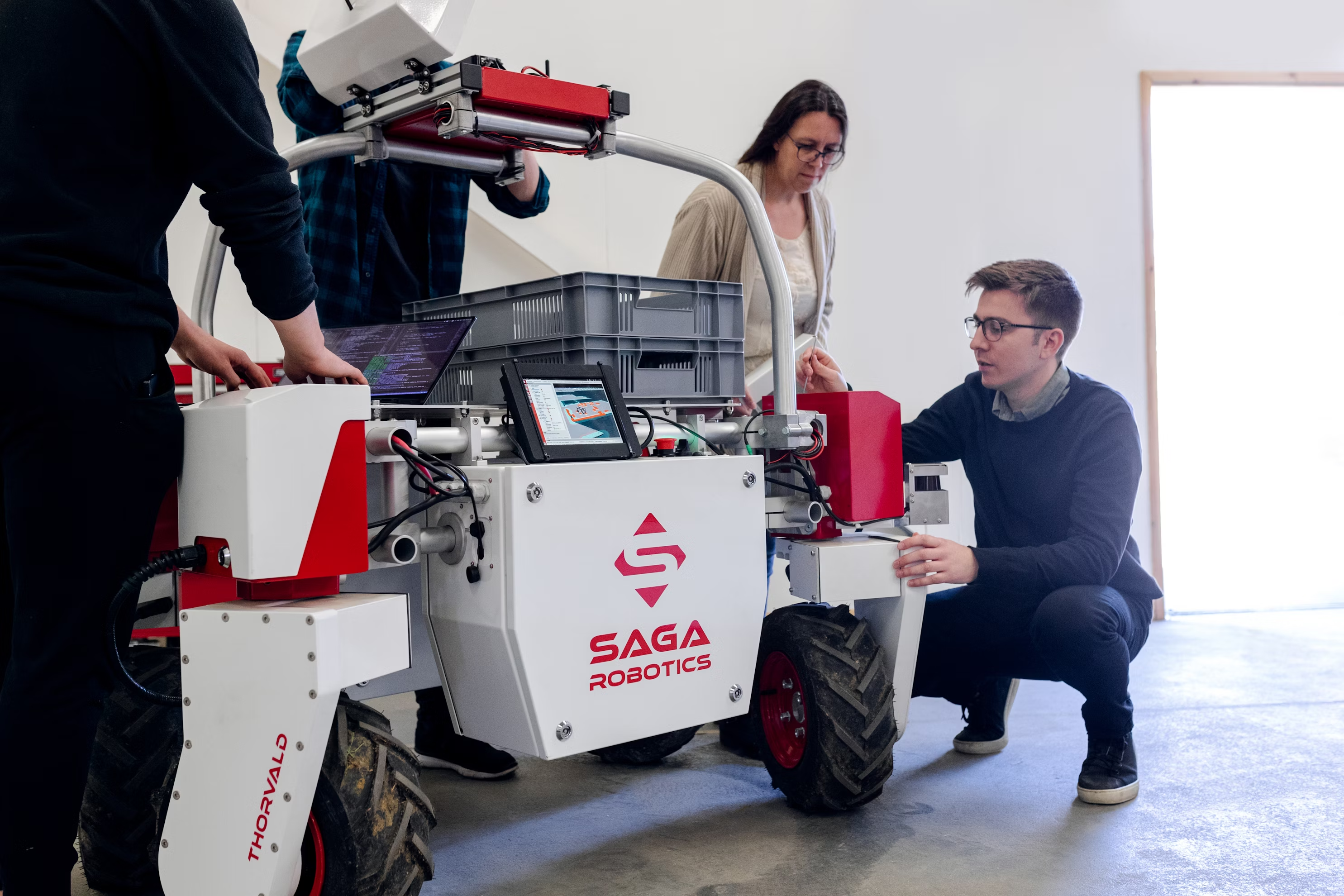In today’s competitive job market, realistically, a bachelor’s in computer science is just the beginning. A master’s degree ramps up your game, diving deeper into advanced tech and honing your problem-solving and leadership skills. With digital transformation sweeping across industries, there’s a growing demand for experts who are not just good but exceptional. Companies are on the lookout for top-tier talent in fields like AI, data science, and software development, and a master’s degree sets you apart. Whether you're aiming to specialize in a cutting-edge area, step into a leadership role, or launch your own tech venture, a master’s degree opens doors to thrilling opportunities and career advancements.
Almost every student asks themselves if it’s worth pursuing advanced education, weighing the costs, benefits, and trade-offs of pursuing a Master’s degree. For many, a Master’s is an opportunity for career advancement or different career opportunities, which begs the question: what opportunities are available thanks to a Master’s degree?
The short answer is that there are many options! Do you want to specialize? Go into management? Work internationally? Start a company?
Let’s dive in further to the career opportunities available with a good Master’s of Computer Science degree.
1. Specialize in a Particular Area or Industry
A master's degree in computer science provides the opportunity to specialize in specific areas, helping you build expertise and stand out in your field. Specializing allows you to focus on advanced, technical challenges that can significantly impact industries. Here are some common areas of specialization:
- Computer Vision: Teaches computers to recognize and understand images and videos.
- Natural Language Processing (NLP): Helps machines understand and work with human language.
- Large Language Models (LLMs): Creates systems that generate and understand text like a human.
- Kernel & GPU Programming: Speeds up complex tasks by improving how software talks to hardware.
- Distributed Computing: Builds systems that run smoothly across many computers at once.
- Autopilot Systems: Develops technology that lets vehicles navigate on their own.
- Blockchain: Designs secure, decentralized systems for tracking digital transactions.
- Cryptocurrency Engineering: Focuses on building systems for digital currencies like Bitcoin.
- Embedded Engineering: Writes software for devices like smartwatches, sensors, or medical equipment.
- Infrastructure Engineering for Backend Systems at Scale: Builds large, reliable systems that support apps used by millions.
- Machine Learning for Medical Devices: Uses AI to improve healthcare devices and tools.
- Machine Learning for Financial Technology (Fintech): Applies AI to make banking and finance smarter and more secure.
- Machine Learning for D2C E-commerce: Uses AI to improve online shopping experiences and personalize recommendations.
- Performance Programming: Optimizes software to make it run as fast as possible.
- Parallel Programming: Develops software that runs on multiple computers at the same time to solve big problems faster.
- And many more!!
These fields offer opportunities to work on cutting-edge technologies that are transforming industries.
As you advance, you can follow the individual contributor track, moving from Senior Engineer to Staff Engineer, and ultimately to Principal or Distinguished Engineer roles. Reaching the principal or distinguished level often requires the depth of knowledge gained through a master's degree. Many engineers thrive in these positions, finding them well-compensated, fulfilling, and intellectually challenging without the need for managerial responsibilities.
2. Pursuing Technical Leadership
Ready to be the tech guru without the managerial headaches? Technical leadership lets you stay deeply involved with cutting-edge tech while steering the strategic direction of projects. If you love diving into technology and crafting solutions but aren’t keen on managing a team, this path is for you.
In technical leadership roles, you’ll be the mastermind behind designing system architectures, setting technical standards, and making crucial decisions. Think of it as being the captain of the tech ship, where your job is to solve complex problems and guide the development process. You’ll work closely with engineering teams, helping them navigate challenges and making sure everything aligns with the company’s goals. Titles like Principal Engineer, Lead Architect, or Distinguished Engineer are all about pushing the boundaries of technical excellence and innovation while providing expert guidance and advice across a department but without having to juggle people management.
 (Gartner)
(Gartner)
3. Transitioning into Engineering Management
Ready to swap your keyboard for a whiteboard? Welcome to engineering management, where your role shifts from coding to leading. Instead of just building products, you're now focused on building and guiding the teams that create those products. And the best part? Your impact grows exponentially.
A. Managing and Leading Technical Teams
Think you’re up for leading a crew of engineers? At high-level roles like Director or VP, a master’s degree often comes into play. Why? Because great managers need to juggle both tech smarts and big-picture vision. Your new gig will involve less coding and more strategizing—helping your team tackle challenges, setting clear goals, and ensuring smooth collaboration across the board. It's about making things happen by empowering others to shine.
B. Overseeing HR Functions: Hiring, Performance Reviews, Compensation
Here’s where the people skills come into play. You’ll be in charge of hiring top talent, keeping your team motivated with feedback, and managing compensation. Balancing the needs of your engineers with the demands of project goals is key. Your role is to keep the team happy and productive, guiding their growth and pushing them to excel.
C. Balancing Technical Knowledge with People Management
The toughest challenge? Keeping your tech skills sharp while mastering people management. You’ll need to stay up-to-date with the latest tech to guide your team effectively, all while honing your communication, motivation, and leadership skills. A stellar engineering manager knows when to dive into the code and when to step back, focusing on empowering the team to succeed. It’s all about finding that perfect balance.

4. Embracing Entrepreneurship
Got a big idea? Your master’s degree could be the launchpad for your own tech venture. If you’re itching to build something of your own, now’s the time to turn your expertise into a startup. With the right mix of knowledge, resources, and hustle, you could be the next big name in tech.
A. Leveraging Your Master’s Degree to Start a Company
Your master’s degree isn’t just a credential—it’s a toolkit. You’ve spent years mastering cutting-edge tech, solving complex problems, and learning how to innovate. Now, you can take that knowledge and turn it into something real. Whether it’s a new app, a breakthrough in AI, or a service that solves a major pain point, you’ve got the skills to make it happen. Plus, with a master’s, you’re already a step ahead when it comes to securing funding or attracting talent.
B. Access to Resources, Networks, and Support Systems
One of the best things about grad school? The connections. Professors, classmates, industry leaders—you’ve built a network of people who can help you succeed. Whether it’s advice, introductions, or potential co-founders, these connections are gold. Many universities also offer incubators, pitch competitions, and mentorship programs to help you get your startup off the ground. And don’t forget the alumni network—you’ll never be short of people rooting for you.
C.1 Inspirational Success Story of Tech Entrepreneurs
Take Sergey Brin and Larry Page, the founders of Google. They started Google as Ph.D. students working on a research project. Armed with advanced knowledge and surrounded by resources at Stanford, they took the leap and turned their idea into one of the biggest companies in the world. Your master’s could be the springboard for your own game-changing startup. It's all about recognizing the opportunity and running with it!
5. Exploring Global Career Opportunities
With a master’s degree in computer science, you’re in high demand worldwide. Tech isn’t just a local affair—countries everywhere are seeking top talent to drive innovation. Whether you’re interested in remote work or moving abroad, your degree opens doors to exciting international opportunities. From coding on a tropical beach to leading projects in bustling tech hubs, you can take your skills global and enhance your career prospects, working for companies that span continents and cultures.
Ready to Take the Next Step?
Eager to dive deeper and transform your career? Explore our MSCS program and see how it can propel you to new heights. With advanced training and cutting-edge resources, you’ll be well-prepared to tackle exciting challenges and seize global opportunities in the tech world. Don’t just dream about your future—start building it today!



